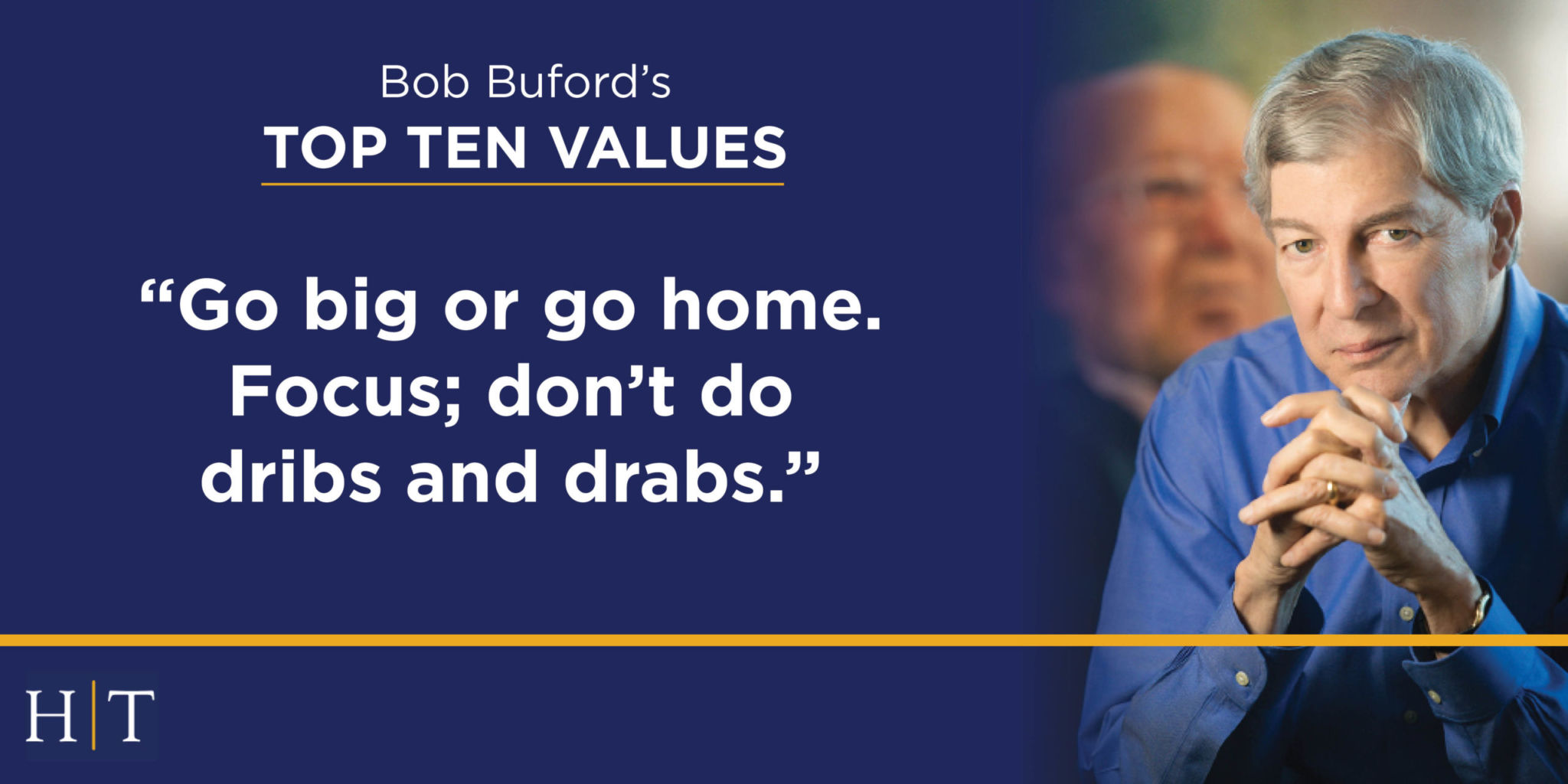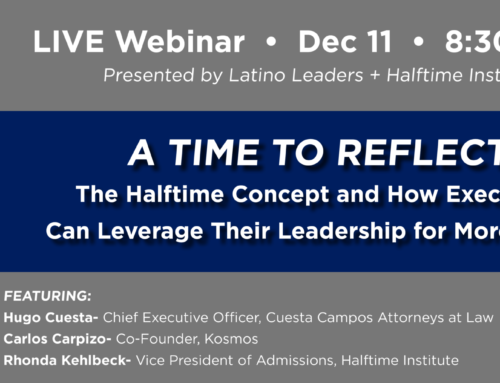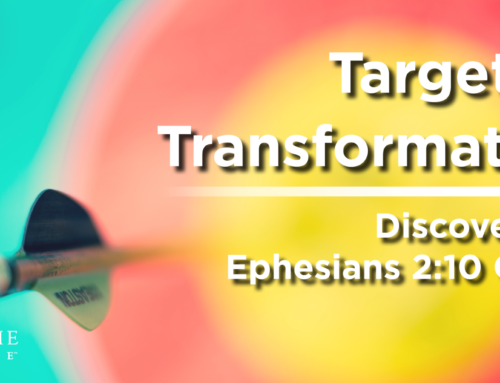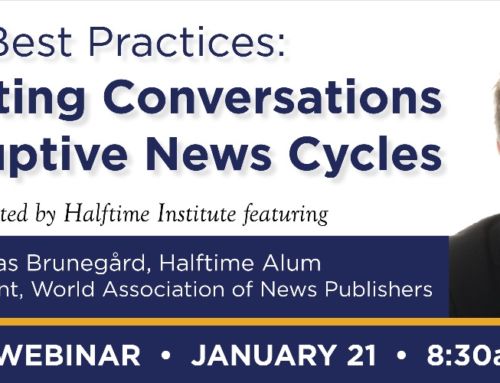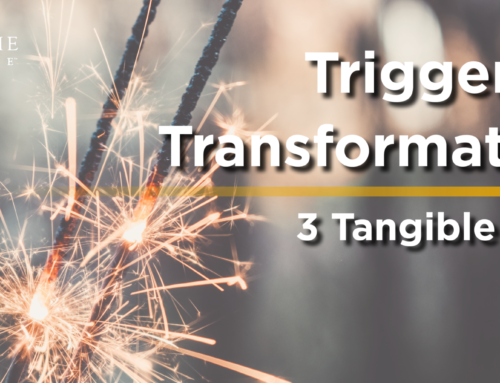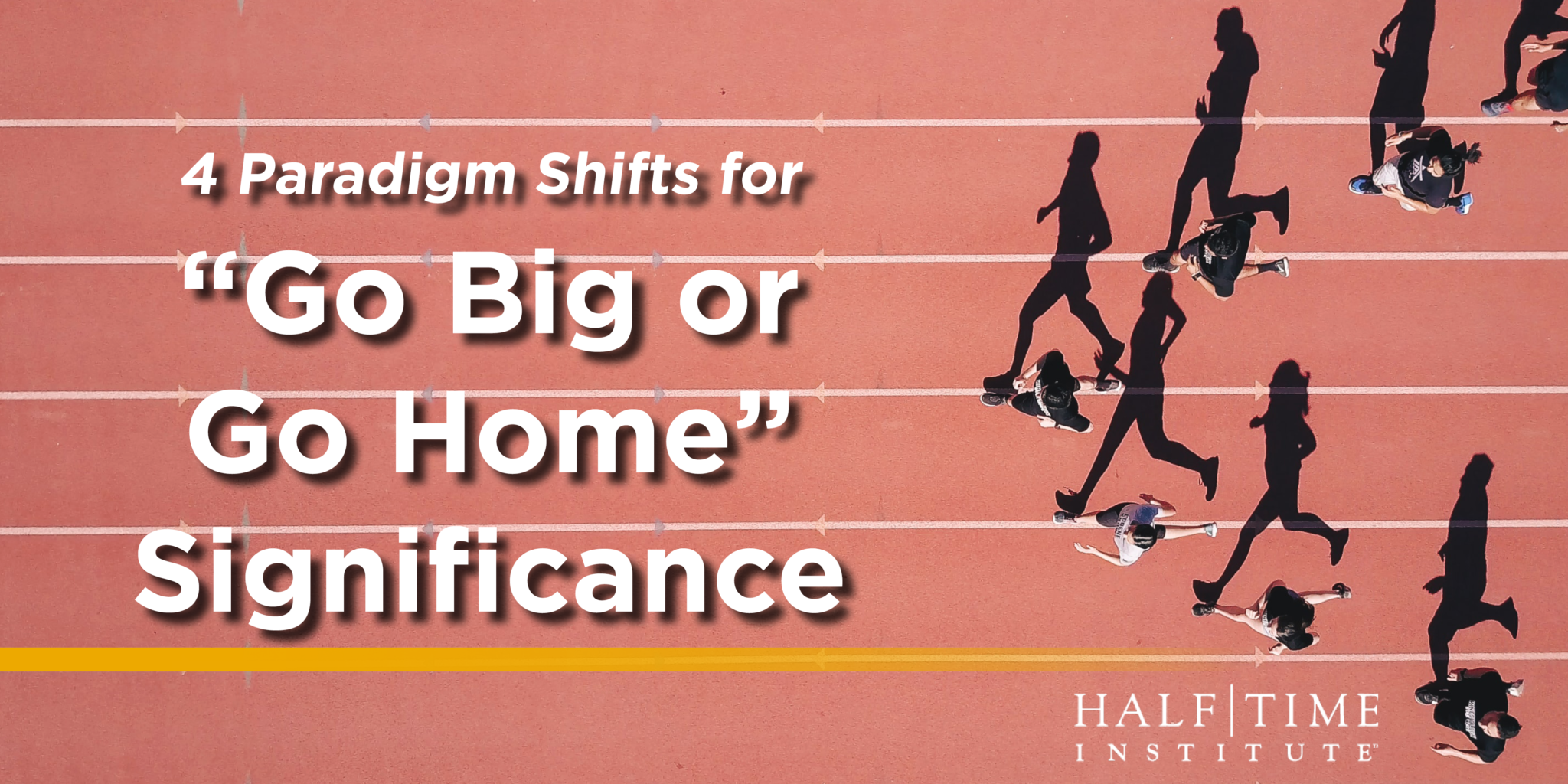
By: Halftime Alum Jim Beckett, Founder and CEO of Beckett Interests Inc.
“Go big or go home. Focus; don’t do dribs and drabs.”
-Bob Buford (1939-2018)
What are you going to do to gain significance?
This was the question that Bob Buford posed to me when we first met thirty years ago. As an advocate for plural mentorship, I had previously identified seven highly respected men from whom I planned to seek wisdom. Bob was the first name on my list and we connected during a time that I refer to as the “two-minute warning” before my halftime began. It was his honest, candid, and helpful feedback that equipped me to formulate an answer to the significance question as I navigated through a season of transition in my business. Bob’s generosity with his time and willingness to refer me to other knowledgeable men had a major influence on my life and provided a model for impacting others.
Bob was a strong believer in “going big or going home.” After all, it was one of his top ten core values. However, he and I approached this concept of “going big” from different angles. We had several conversations together on the subject and the different ways it played out in each of our lives. Personally, I’m after fulfilling the “spirit” of this value more so than the “letter.” As a recovering linear thinker, I’m learning that sometimes it’s okay to not always take the most direct route to a destination. I’m giving myself permission to look in a fresh way at the good works that God has prepared for me to walk in (Ephesians 2:10).
My hope is that the ideas below serve to show others there are a multitude of models for being involved in impacting the lives of others. When we expand the scope of what it looks like to live with influence, it eliminates some potential barriers to getting in the game.
Four Paradigm Shifts for “Go Big or Go Home” Significance
1. Go Big … or Broad, or Deep, or Wide
There is more than one way to go big.
Bob and I had different strengths, experiences, and interests, so it is natural that our strategy for impactful living reflected those differences. Bob preferred a more focused approach to leveraging his time and talents. He typically invested in a handful of leaders for an exponential result. If Bob’s method was spending 100 hours each with 10 key players, my method is more along the lines of spending 2 hours with 500 entities. Both methods lead to impact.
I regularly interact with numerous local, national and international ministries, non-profits, and leaders on a pro-bono basis, both personally as well as through an informal SHINE network. SHINE (Strategic, Hosting and Hospitality, Interactive and Intercessory, Networking, Encouragement) provides strategic encouragement and insight to organizations that may not be in the financial position to prioritize professional coaching or consulting.
We’ve often heard the adage of being “a mile wide and an inch deep” as a negative, but imagine the reach a mile can have. If it only takes an inch for a seed to germinate and take root, the mile-wide approach may make sense in certain climates.
2. Lean Into Your Bent
Refusing a one-size-fits-all mentality frees you up to focus on how you can best use your unique giftings.
I often refer back to The Amplified Bible translation of Proverbs 22:6:
Train up a child [an impressionable person] in the way he should go [and in keeping with his individual gift or bent], and when he is old, he will not depart from it.
This verse suggests that we were created with unique and intentional wiring. It’s when we lean into our individual bent that we can best live out our God given assignment. My involvement in Halftime Institute programs has been instrumental in developing a strategy to do this.
I participated in one of the earliest prototype groups at Halftime Institute where all 12 members knew each other previously. Five years later, I was in a second Halftime group that included individuals I had never met before. The dynamic was completely different. While friends tend to give you a pass on things, the fresh insight and friction from strangers was refining and extremely valuable. Similar to today’s Halftime Institute Fellows Program, this space allowed for outside perspective that brought clarity around my specific calling and how I could best live that out.
3. Focus on Faithfulness, Not Fruit
Like Bob was known to say, “The fruit of our work grows up on other people’s trees”. It can be tempting to become over concerned with how much fruit is being produced. While it’s natural to want to know that we’re making a difference, the end results of our labor often aren’t visible until further down the line (if at all). This doesn’t mean that our efforts aren’t significant.
We can focus on being faithful stewards of our time, talent, and treasure and trust God with the fruit. After all, it is the Holy Spirit who does the work according to 1 Corinthians 3:7:
“So, neither the one who plants nor the one who waters is anything, but only God, who makes things grow.”
I have the opportunity to participate in the process by planting or watering, but it is God that gives the increase. When we remember this truth, it takes the pressure off. At the end of the day, we can rely on God to equip us to fulfill His purposes in our lives.
Similarly, we can be faithful with our full stories, trusting God to use each part. I’ve learned that when I expose my own vulnerabilities, it allows others to shake off their own bullet-proof mentalities. God’s faithfulness is most fully displayed in the entirety of our individual stories.
4. Redefine Dribs and Drabs
Christian Business Executive and Leadership Mentor, Fred Smith, another of my original seven, often explained that “you can never know the impact that you’re going to have on someone”.
Just as Bob was generous with his time toward me, I want to be generous in sharing my calendar with others, taking the time to learn their stories and provide input where I am able.
It is possible to look at a single, one-off conversation as a “drib or drab” in our own perspective. However, to the individual or organization on the other side of the table, the conversation may be hugely transformative. A strategic meeting with a seasoned expert will not be insignificant to a small ministry. If they are taking initiative to overcome the fear of embarrassment and seek wise counsel, who knows what God will do.
And don’t forget: If your next season mission doesn’t involve a global reach, that’s okay. Whether it’s rocking babies in an inner-city hospital or mentoring local leaders, your effort will not be perceived as a “drib or drab” to the lives you are touching. Instead, making excuses or delaying obedience is what will keep you out of the game.
Ultimately, it is less go big OR go home and more go big AND go home. Don’t quit because you’re questioning the size of your impact. Get out there and do what you’ve been called to do. Know that you have a heavenly “home” waiting for you and work for the exclamation of “Well done, my good and faithful servant” in store when you get there.
If you don’t know what it is that you’re called to do, or if you could benefit from accountability as you live that calling out, getting connected with a Halftime Coach and Cohort may be a great next step. Our Halftime Certified™ Coaches are here to act as a sounding board, thought partner, and encourager as you process and prepare for the season ahead.
BOB BUFORD is known for being the voice of a generation, a prolific author, speaker, and philanthropist whose immense and widespread contribution to business leadership, personal transformation, and the growth of the modern church cannot be measured. Bob’s book Halftime began a movement of an entire generation of successful business professionals transitioning to a LIFE OF EVEN GREATER SIGNIFICANCE and eventually to the creation of the Halftime Institute. Join us as we honor his legacy by exploring Bob Buford’s Top Ten Values over the course of the year.
